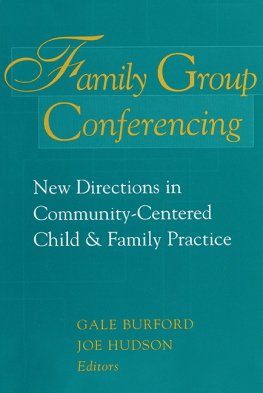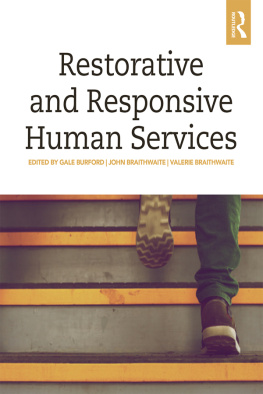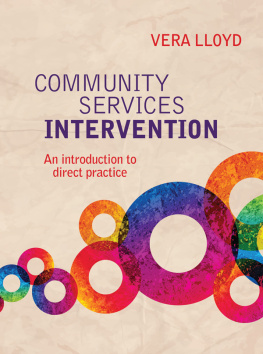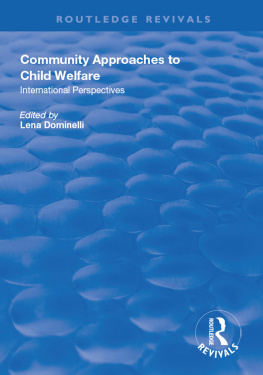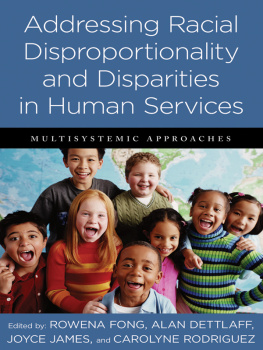Family Group Conferencing
Family Group Conferencing
New Directions in Community-Centered Child and Family Practice
Gale Burford and Joe Hudson editors
First published 2000 by Transaction Publishers
Published 2017 by Routledge
2 Park Square, Milton Park, Abingdon, Oxon OX 14 4RN
711 Third Avenue, New York, NY 10017, USA
Routledge is an imprint of the Taylor & Francis Group, an informa business
Copyright 2000 by Taylor & Francis.
All rights reserved. No part of this book may be reprinted or reproduced or utilised in any form or by any electronic, mechanical, or other means, now known or hereafter invented, including photocopying and recording, or in any information storage or retrieval system, without permission in writing from the publishers.
Notice:
Product or corporate names may be trademarks or registered trademarks, and are used only for identification and explanation without intent to infringe.
Library of Congress Catalog Number: 00-038041
Library of Congress Cataloging-in-Publication Data
Family group conferencing : new directions in community-centered child and family practice / editors, Gale Burford and Joe Hudson.
p. cm.
Includes bibliographical references and index.
ISBN 0-202-36121-7 (cloth : alk. paper)ISBN 0-202-36122-5 (pbk. : alk. paper)
1. Family social work. 2. Social work with children. 3. Child welfare. 4. Family counseling. 5. FamilyDecision making. 6. Social networks. I. Burford, Gale. II. Hudson, Joe.
HV697.f3635 2000
362.82dc21
00-038041
ISBN 13: 978-0-202-36122-2 (pbk)
ISBN 13: 978-0-202-36121-5 (hbk)
Gale and Joe dedicate this book to
Gales sister Mary Jane and her children
Jessi, Zeke, and Morning Star
Contents
Gale Burford and Joe Hudson
SECTION I
INTRODUCTION: ORIGINS AND PHILOSOPHICAL FRAMEWORK
Rupert Ross
Catherine Love
John Braithwaite
Kay Pranis
David Moore and John McDonald
SECTION II
INTRODUCTION: PRACTICE FRAMEWORKS
Anthony N. Maluccio and Judith Daly
Susan P. Kemp, James K. Whittaker, and Elizabeth M. Tracy
Ted Wachtel
Paul Nixon
Paul Adams
Kay Pranis and Barry Stuart
Don Fuchs
John D. Burchard and Sara N. Burchard
Charles Waldegrave
Jennifer L. Boland, Cynthia M. Collea, Judith Daly, Ruth Hale, and Thomas E. Hill
Joan Pennell and Gale Burford
SECTION III
INTRODUCTION: COMPARATIVE PRACTICES
Mike Doolan and Pam Phillips
Knut Sundell
Peter Marsh and Gill Crow
Linda Crozier
Lisa Merkel-Holguin
Paul Ban
Judy Cashmore and Patricia Kiely
Joan Pennell and Marie Weil
Paul M. Sivak, Reverend Nathaniel Green, and Teri Kook
Ted Keys and Anna Rockhill
SECTION IV
INTRODUCTION: EVALUATING FAMILY GROUP CONFERENCES
Gordon Bazemore and Jeanne B. Stinchcomb
Yvonne Unrau, Jackie Sieppert, and Joe Hudson
William Vesneski and Susan Kemp
David Crampton and Wendy Lewis Jackson
Foreword
Contemporary North American child welfare exists in a global context. Concerns about the prevention of child maltreatment, permanency planning, risk assessment in child protection, and family support in its numerous forms, increasingly define what has become a common agenda for policymakers, senior administrators, researchers, and practitioners in most industrialized countries. The recent exponential growth of technology means that service innovations once considered local now find their way rather rapidly into what has become an international discourse on innovative practice. Thus, patch programs of geographically based integrative services from the United Kingdom are imported to the United States at the same time as family preservation strategies are exported to a wide range of venues from western Europe to Australia. No doubt each of these transplants will be altered by their new host cultures sufficiently to allow for their rediscovery after a decent interval has passed.
Whether the resultant services will be simply old wine in new bottles, or improvements on the original innovation, remains to be seen. Critical perspectives are much needed both to set the cultural/historical context for looking at new and promising ideas in services, as well as to appreciate the incremental enhancements they have acquired. Key questions for planners and practitioners include:
What was the specific cultural context within which the service innovation arose and what are the cultural requisites that sustain it at present in its culture of origin?
What modifications will likely need to be made if the innovation is to be adopted in another country or culture?
What is the valuative and empirical-evidential base for the innovation, and what questions should inform the next generation of studies on its efficacy?
What are the points of potential conflict and complimentarity between the service innovation and the existing service continuum?
What will likely be the key issues in implementation, and what network of champions will be there to sustain the innovation during the critical phase of its introduction?
By what outcome measure(s) will the innovation be adjudged a success?
These and related questions are particularly germane for the subject of this present volume, Family Group Conferencing. Since its origins in the Maori culture in New Zealand, Family Group Conferencing in one form or another has attracted widespread attention in North America, western Europe, and Australia both as a front end (preventive) service, and also as a culturally sensitive intervention for children, youth, and families already deeply enmeshed in the service system. Among its features of interest are its blending of lay and professional helping, its focus on family empowerment, its cultural relevance, and its creative use of the group process. Contributors to the Burford and Hudson volume offer a rich menu of topics that, taken together, illuminate the landscape where Family Group Conferencing originated in addition to providing a snapshot of its potential applications. A careful reading of Burford and Hudson will yield in ample measure a perspective on what could perhaps be called the most intriguing child welfare innovation to arise in the last quarter century. As seasoned researchers and program developers they have chosen their contributors wisely, and the resultant volume is perhaps the most comprehensive statement on Family Group Conferencing to appear in the international literature of social work and child welfare. It will serve as a valuable sourcebook for practitioners, planners, and students of child welfare. The authors offer a rich and diverse array of critical perspectives that will aid immensely in understanding the potential strengths and limitations of this intriguing innovation. The authors strive to balance in their various selections aspects of policy, practice, and research perspectives. All who work with, plan services for, or conduct research on services for children and families will find something of substance in this volume. It is particularly timely for the U.S. context where critics from differing philosophical perspectives are increasing their calls for a total overhaul of the child welfare system. This richly detailed and provocative volume by Burford and Hudson and their colleagues provides both a stimulus and a catalyst to this debate.

